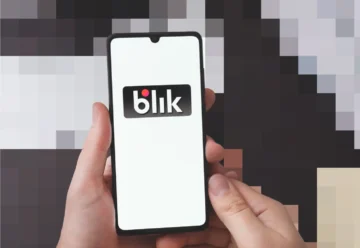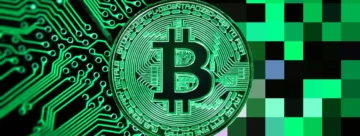Is DeFi Really the Future of Finance?

DeFi. It’s a term thrown around as often as “Web3”, “NFT”, and “HODL”. Yet besides being a cool buzzword to slip into conversation and impress all your friends, it has much more importance. Emerging in around 2017, the term really began to gain traction. We often hear crypto enthusiasts gushing about the future and how any savvy user, businessman, and investor, will be eyeing up the prospects of DeFi and rubbing their hands together in anticipation. This brings me to the ultimate question, is DeFi really the future of finance?
DeFi vs. TradFi

First things first, let’s just clarify what we’re dealing with here. Traditional Finance, or TradFi, as it’s been dubbed, represents all that we know about the world of “traditional” finance. It’s the mainstream way we’ve been using finance since institutions began. Of course, over this time, TradFi has seen its fair share of epic changes. At the turn of the Millenium, paying by cheque was still a common thing. The very thought of paying by card, let alone from a watch was pure fantasy. Interesting isn’t it, that now we would look at paying by cheque as absolutely archaic and full of security risks? How would the salesperson ever know there was money in that customer’s account? How would you be able to prove a cheque was fake or belonged to another person? Fortunately, we don’t need to worry about such issues anymore. We’ve got bigger fish to fry in the form of hacks and multi-million dollar scams.
The thing is, technology has evolved so much that we are ready for the next step. If paying from your mobile using a banking app is as normal an occurrence as the sun rising and setting, why would Decentralized Finance be any different? After all, we don’t really “see” our physical money sitting in a bank, and security is always important. More to the point, the rise of digital currencies has taken the world by storm and despite many seemingly cautious steps being taken toward adoption, countries are jumping into DeFi feet first. In fact, the Atlantic Council revealed that in 2022, “at least 90% of the world’s central banks were developing government digital currencies.” So, for those nay-sayers out there, let’s have a look at the benefits DeFi brings.
Put simply, Decentralized Finance is an umbrella term for a whole host of apps and financial services that are concentrated on blockchain technology. As we already know, the whole point of blockchain is to keep assets, tokens, crypto, coins, etc. on a decentralized network with no central authority.
So, Is This All Hocus Pocus?

Many newbies to the world of crypto often think this. Usually, it’s due to a few reasons: the virtual nature of the assets, clever and bold terms, and scandals in the media. The “virtuality” of crypto and DeFi leads a lot of people to disregard assets as having no “real-life” value — yet we can see stablecoins being widely used, which act as a bridge between both the physical and virtual worlds. The “clever slogans and claims” are things like statements professing the secure nature of assets and the unlimited possibilities… quickly followed by record-breaking hacks. Lastly, the scandals. Yes, the FTX collapse really is the elephant in the room. Anyone au fait with Sam Bankman-Fried before the collapse will remember his confident podcasts and boasts of the never-ending earning potential of crypto and the wider system. Seeing him a few months later in court on charges of fraud and $5 billion of investor’s money hanging in the balance aren’t exactly the most calming factors.
However, despite all of this, the technology itself and the way it works, not to mention the vision for the future is still revolutionary and it isn’t hard to see how it’ll fit in with our daily lives.
A world without borders — DeFi is a whole other world. There are no physical borders or geographical limits here.
Faster and more transparent — Thought cheques were slow? They’ll look like glaciers moving down a mountain compared to DeFi. Blockchain technology is fast, with many transactions taking place instantly. Plus, the added bonus of no central power means there’s nothing to get in the way. Need to make a payment? All the details are set out in smart contracts, so when you enter that contract, there’s nothing else for you to worry about. There are no hidden bumps or twists in the road. It’s there in the smart contract for all to see.
System interoperability? — Worried about whether or not systems will be compatible? The beauty of DeFi is that you can make protocols and dApps (Decentralized Applications) as integrated as you need them to be — integrating much deeper into other financial solutions and services.
Who’s in control? — Easy answer — you! As written above, DeFi doesn’t have a central bank or organization, it’s completely decentralized and free from outsider influence. This means that you and only you have control over your finances.
So, What Does the Industry Say?

DeFi projects have seen a slump of up to 70% in total TVL (Total Value Locked) since April 2022. No, we’re not entering a DeFi winter just yet, as further data reveals much more than meets the eye. Despite the initial shock, DeFi would seem to be rather resilient.
Apart from crypto-related drama, the word on the street is DeFi has arrived, and it looks like it’s here to stay. Deloitte published a whitepaper on post-trade detailing how it’ll be possible to save up to 80% of post-trade settlement expenses by leveraging distributed ledger technology (DLT). This is a big plus as DeFi and the wider Web 3.0 world look to cut expenses by removing archaic and obsolete functions. Even its decentralized nature is a cost-cutting solution as third parties that would otherwise eat up funds in the form of commissions are removed.
CEO and Founder of Chains.com, Anderson Mccutcheon, doesn’t share such an optimistic view, sharing “DeFi is headed downward. The future of retail finance lies within systems that are regulated, secure and provide users with products and services that they can easily understand.”
This may be a view shared among many in the financial world, however, it still doesn’t detract from the overwhelming positive solutions this technology offers. Regulation is a vital part of finance and if this is a stumbling block for some, it’ll be interesting to see how companies tackle such a sticking point.
A report released by PWC details the future of DeFi covering a number of points, including governance, security, tax, and regulations. Some of the main takeaways being that “DeFi is evolving and expanding swiftly to mirror the traditional financial services ecosystem. This new form of decentralized financial technology may eventually have an impact on the future of centralized finance entities, with DeFi potentially being seen as an alternative that’s cheaper, quicker and more relevant.”
In a Nutshell

To wrap things up, banking in 2023 is not what it was 50 years ago. Even if we compare 2023 to 2013, the differences are profound. Global events, Covid, the rise of the Internet and the digital world are all contributing factors to the rapidly changing financial world. If we take a look at retail, the need for brick-and-mortar stores has declined and businesses have had to adapt working alongside the Internet not simply for survival, but for their businesses to flourish. Why go to 5 different shops looking for a pair of shoes when you can simply go online and see who has what and where.
Changing tact, setting up websites and providing convenient services is a way successful stores have retained their customers. Banking can take a leaf out of this book. Free and instant payments, no middle man, being in charge of your money, is something that many find appealing. We’ve already seen how switching to electronic payments can save heaps of money and time (no more struggling to find change with a huge queue forming!), so the benefits are visible from the start. However, the issue that keeps coming back time and time again is the question of control. Will DeFi be able to offer enough accountability to appease government organizations?
It’s a dog-eat-dog world, and the fact of the matter is a lack of clarity of usability, legality, security… mixed with a constant stream of scandals and doomsday headlines could potentially sink this ship. The technology is there — what may seem outlandish today could be genius tomorrow. Just like with brick-and-mortar stores, it’s those who look ahead, prepare, and keep an eye firmly on the changing state of events that’ll reap the rewards.











